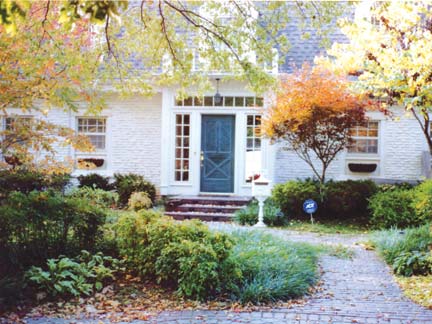| Issue #4 March 17th - March 30th, 2006
Top Ten Organic Gardening Tips Here it is, Thom Marak’s Top Ten Organic Gardening Tips! Thom is the owner and operator of Next-to-Nature, which offers both organic gardening supplies and organic consulting. But, before we get to his list, I first asked Thom to respond to my previous article, particularly wondering if he had anything to add to the definition of standards set by the National Organic Standards Board. He said he would simplify that statement and say only, “Don’t fight with Mother Nature. Learn Her dance, let Her lead.” In fact, that is item number one on his list: Don’t fight Mother Nature, remember who made our planet and all of its incredible richness. So, be nice to Her! 2. Dig a $10 hole for a $1 tree. Thom recommends making the size of the hole you’re planting in appreciably larger than the container size of the plant. Also, he does not recommended overly amending the soil directly around the new plant as that ‘trains’ the roots to stay close to the plant rather than encouraging an extensive root develop into surrounding soil habit as roots search for food and water. In this case, a lesser amount of amendments will actually help to stabilize and nourish the plant as it matures.
4. Don’t double dig. Thom says that if you’ve got that much energy you can come over and dig his “fraidie hole” for him. (And let him start your garden plot!) No-till farming is becoming the movement of the day - roots grow regardless of tilling. 5. Discover the benefits of horticultural cornmeal. This product has more uses than compost. In fact, Thom notes that you can put it in your compost, as it is high in nitrogen and acts as a natural antiseptic (you can soak your feet in horticultural cornmeal). 6. An important rule for vegetable gardening... plant extra! “What ‘they’ don’t eat, is left for you.” 7. Best kept secret: in Oklahoma we have 9 months of great vegetable gardening (September - May) June, July, August are too hot, too many bugs. During these ideal growing periods you can develop crops of cabbage, brussel sprouts, broccoli, bok choy, leeks, onions, lettuce, spinach etc... Don’t forget about these winter crops! 8. Trust your instincts. Remember, gardening is part of our genetic history - we were hunters and gatherers - gardeners survived and we all have access to a deep knowledge base about how to garden. 9. Experiment. Even if you are a novice, it’s ok to learn and make mistakes. It’s the novice who discovered something great doing something they didn’t know they weren’t supposed to do. 10. Garden in raised beds. If you’re gardening a small area, plant in raised beds - you can reach the beds more easily for weed control and watering, . 11. One more: In the successful organic garden there is no such thing as “waste product.” Everything is cyclical. Thom’s last words? “Garden for your health!” |
||
©2006 NONCO Media, L.L.C.

 3. Compost is the great equalizer. It’s ok not to soil test - if you are using compost, and your soils are too acidic or basic, the compost will balance either of those conditions. Mike McGrath (of You Bet Your Garden - a weekly NPR garden show) states on his website that we can all make (or buy, borrow, steal...) compost! Commercial fertilizers are harsh chemical salts that weaken your plants in the long run. (And they pollute our waterways and natural areas. And they say bad things about people. And none of the other girls like them. And…) Feed your garden the way Nature feeds the forests—with compost made from shredded leaves, kitchen waste and, if you’re lucky, some horse, cow or poultry manure. An inch or two of compost a year provides all the food any plant needs, and it makes your landscape naturally resistant to disease and insect pests.
3. Compost is the great equalizer. It’s ok not to soil test - if you are using compost, and your soils are too acidic or basic, the compost will balance either of those conditions. Mike McGrath (of You Bet Your Garden - a weekly NPR garden show) states on his website that we can all make (or buy, borrow, steal...) compost! Commercial fertilizers are harsh chemical salts that weaken your plants in the long run. (And they pollute our waterways and natural areas. And they say bad things about people. And none of the other girls like them. And…) Feed your garden the way Nature feeds the forests—with compost made from shredded leaves, kitchen waste and, if you’re lucky, some horse, cow or poultry manure. An inch or two of compost a year provides all the food any plant needs, and it makes your landscape naturally resistant to disease and insect pests.